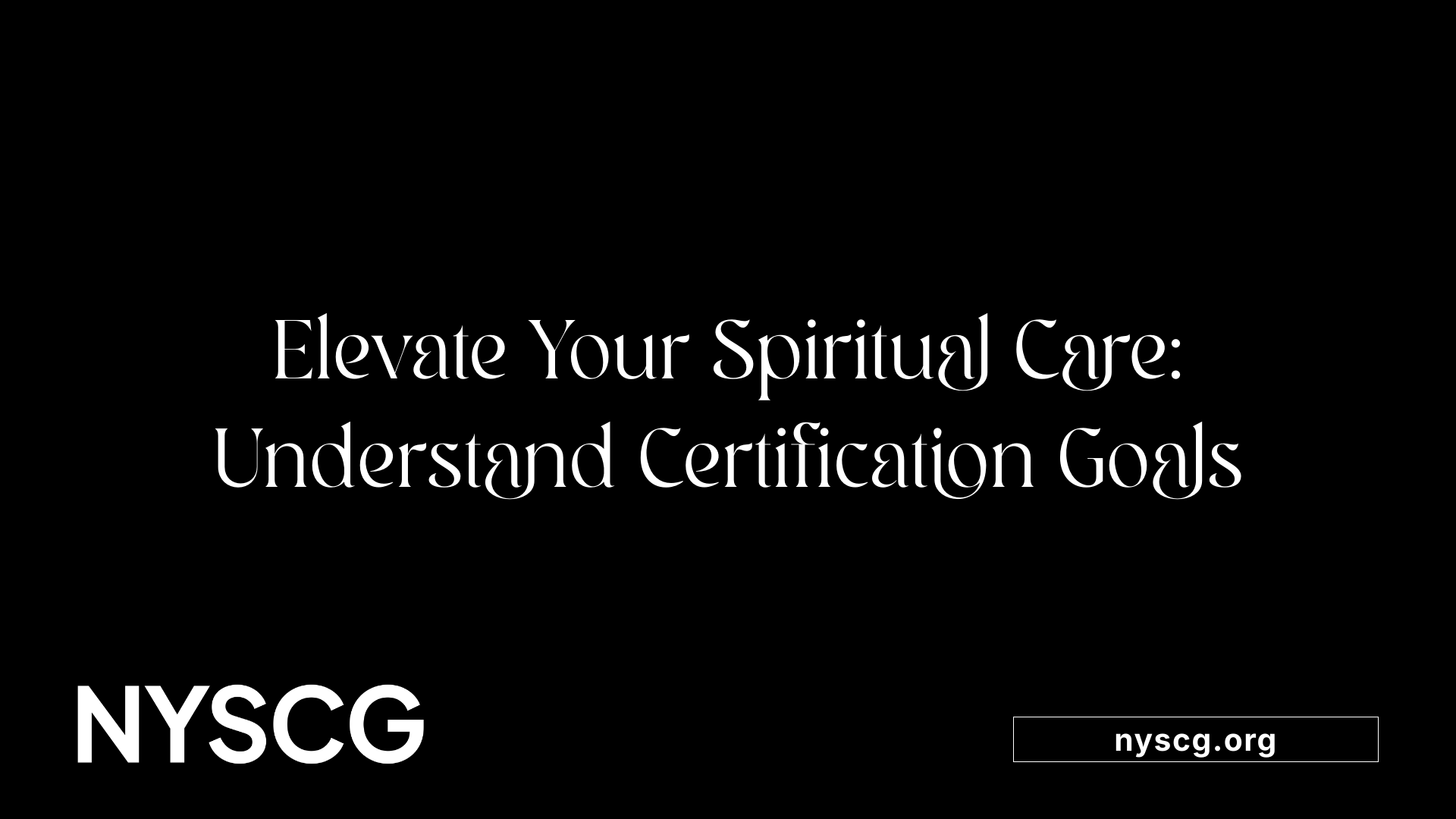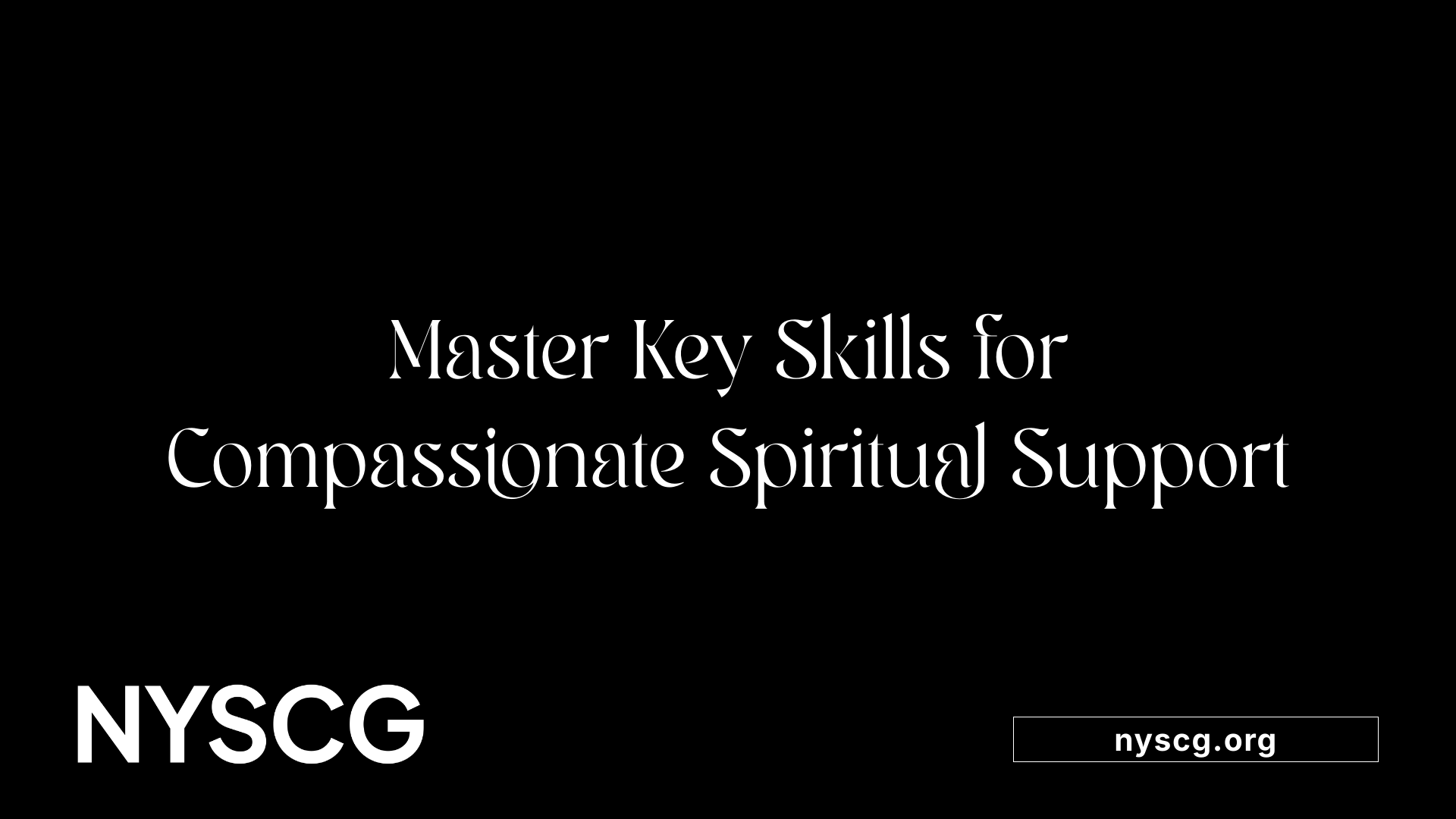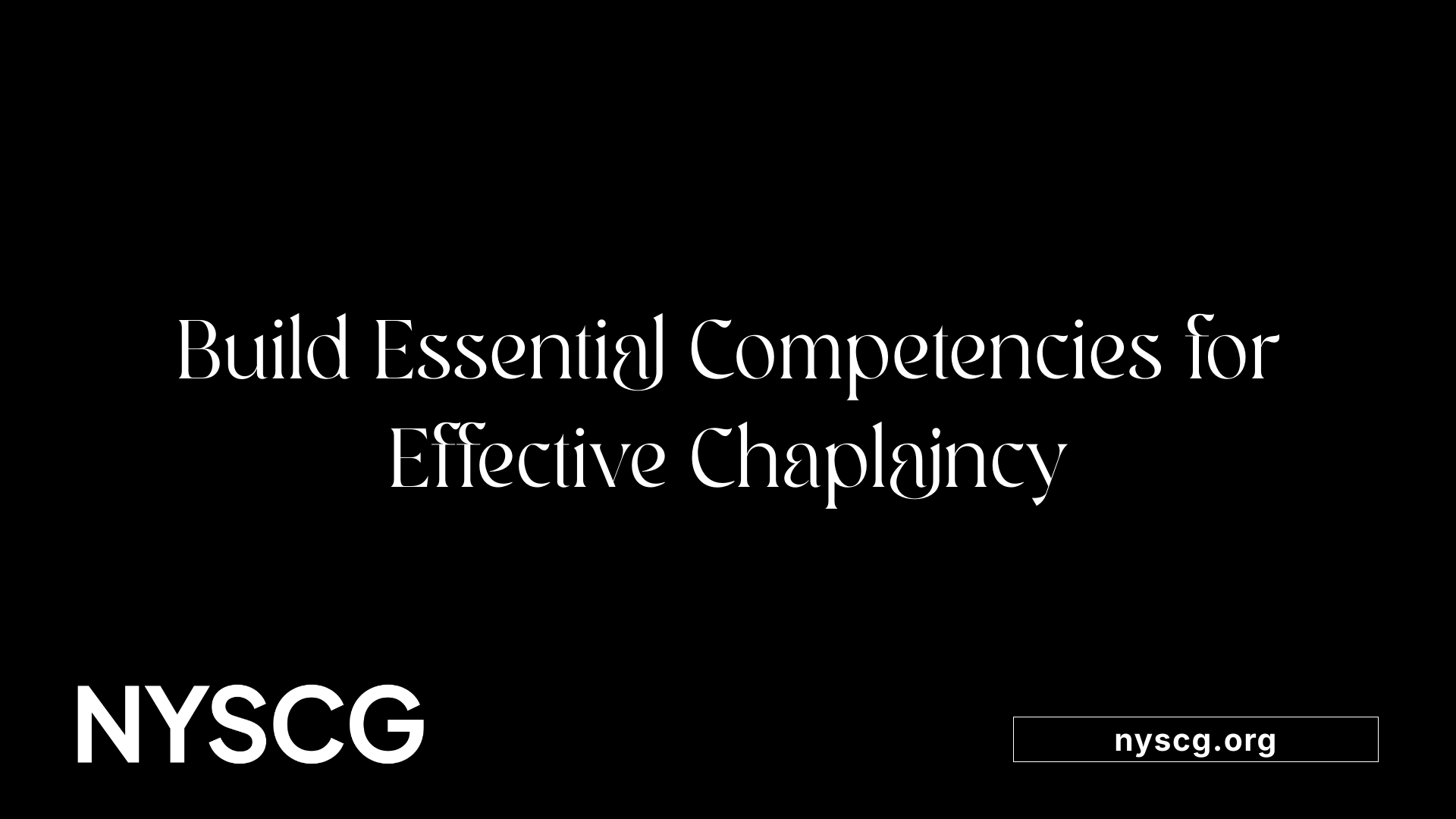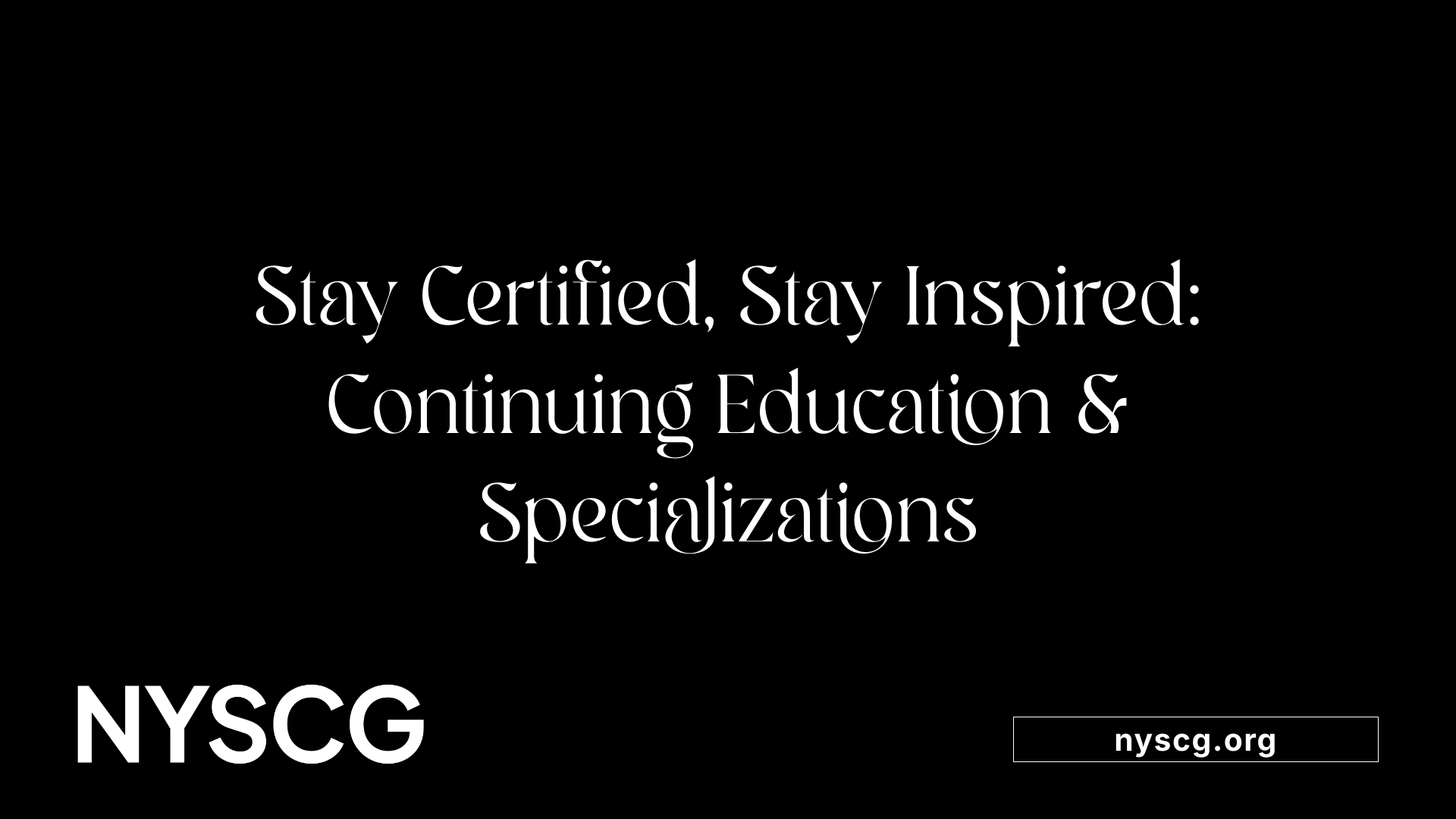Core Skills You’ll Learn in a Modern Chaplain Certification Course


A modern chaplain certification course offers comprehensive training designed to equip professionals with the core skills needed to provide effective, ethical, and culturally sensitive spiritual care across diverse settings. This article explores the curriculum, competencies, practical skills, and professional standards involved in becoming a certified chaplain, emphasizing the importance of rigorous education and continued professional development.

Chaplain certification programs are designed to uphold high professional standards in spiritual care. Their main goal is to ensure that chaplains are equipped with the necessary knowledge, practical skills, and ethical understanding to serve effectively. These programs validate a chaplain's competence through a combination of rigorous educational requirements, competency demonstrations, and real-world experience.
By certifying chaplains, the programs aim to enhance credibility and improve employment prospects. They help chaplains develop cultural competence and acquire specialized skills needed to address complex spiritual needs. Whether in hospitals, prisons, military bases, or community settings, certification ensures that chaplains can provide quality, ethical, and compassionate care that meets diverse individual needs.
Ultimately, these programs seek to elevate the overall quality of spiritual care services, fostering ongoing professional growth and ensuring that chaplains are prepared to handle the sensitive and multifaceted nature of their work.

A modern chaplain certification program covers a wide array of skills vital for providing compassionate spiritual and emotional support. Central to the curriculum are pastoral care, spiritual counseling, and crisis intervention. These skills enable chaplains to respond effectively during emergencies, providing comfort and guidance to individuals facing distressing circumstances.
Active listening and empathetic communication form the foundation for building trust with patients, families, and communities. Cultural competence is also emphasized, allowing chaplains to serve diverse populations with sensitivity and respect. Ethical principles aligned with professional standards, such as those outlined in the APC Code of Ethics, guide practice.
Further competencies include spiritual assessment techniques, working knowledge of various world religions, and understanding the nuances of faith and spirituality across different backgrounds. Chaplains are trained in managing stress, maintaining confidentiality, and working collaboratively within interdisciplinary teams.
Advanced aspects of training involve clinical assessment and diagnosing spiritual distress, leadership roles in healthcare or community organizations, and skills necessary for ethically navigating complex situations. These core skills ensure chaplains are prepared to provide holistic care that respects individual beliefs and needs.
Practical training within chaplaincy education focuses on direct application of skills that meet real-world needs. Courses highlight the importance of pastoral care, spiritual counseling, and crisis intervention, preparing students for a range of scenarios from medical emergencies to end-of-life care.
Chaplain trainees learn to assess patient needs thoroughly, clarify care goals, and address suffering caused by physical symptoms or emotional distress. Certification programs incorporate tools such as spiritual screening questionnaires and caregiver assessment instruments like the Zarit Burden Interview (ZBI-12).
Specialized modules prepare students for sensitive conversations about hospice, palliative care, and managing pain. They also cover emergency preparedness, trauma response, grief support, and suicide prevention.
Additional training topics include ethical decision-making, interfaith dialogue, and the use of religious and spiritual resources in counseling. This comprehensive approach equips chaplains to serve effectively in healthcare environments, prisons, military settings, or community outreach.
Overall, these practical skills foster the ability to provide empathetic, culturally-informed, and ethically sound spiritual care tailored to individual needs and circumstances.

To become an effective chaplain, candidates must acquire a blend of educational credentials, specialized training, and personal development. Most organizations require candidates to hold at least a graduate degree in theology, ministry, psychology, or related fields from an accredited institution. Additionally, completing Clinical Pastoral Education (CPE), which consists of supervised field training, is often mandatory.
Endorsement from one's faith or spiritual tradition is essential, providing spiritual legitimacy and support. Chaplains need to demonstrate competencies in spiritual assessment, such as using tools like the Spiritual Screening Tool, and in creating individualized care plans that address patient needs and goals.
Core skills include strong communication abilities, active listening, and cultural sensitivity to serve diverse populations effectively. Ethical practice is crucial, requiring adherence to a professional code of ethics and ongoing reflection on personal and professional boundaries.
Further competencies include facilitating interdisciplinary teamwork, managing ethical dilemmas, and developing group processes. Personal qualities such as self-awareness, spiritual maturity, and respect for diversity underpin effective pastoral care.
Maintaining certification demands continuous education, peer review, and staying current with research and best practices. Overall, a combination of educational background, practical training, ethical integrity, and personal growth equips chaplains to serve across healthcare, correctional facilities, military settings, and community organizations.

Maintaining certification in chaplaincy involves a renewal process that generally occurs every five years. This process requires chaplains to demonstrate ongoing professional development, participate in continuing education, and keep their skills current with evolving practices and ethical standards. Engaging in continuous learning ensures that chaplains remain effective in providing spiritual and emotional care across diverse settings.
Chaplaincy training is not static; it adapts to new healthcare protocols, cultural considerations, and societal issues. Ongoing education may include attending workshops, completing online courses, or engaging in research. These activities expand a chaplain’s knowledge, improve their skills, and often count toward renewal credits.
Specialty certifications allow chaplains to focus on particular areas where specialized knowledge enriches the quality of care they provide. Certifications like the Palliative Care and Hospice Advanced Certification (BCC-PCHAC) support chaplains working in end-of-life situations, emphasizing pain management, emotional support, and ethical decision-making.
Veteran and military chaplaincies also have tailored certification options, such as the Board Certified Chaplain for Veterans Affairs (BCC-VA). These certifications prepare chaplains to address the unique spiritual needs of service members, veterans, and their families, often involving understanding military culture, trauma, and resilience.
Advanced certifications and ongoing education opportunities foster leadership within chaplaincy networks. Many programs include modules on organizational leadership, team management, and administrative skills, preparing chaplains for roles such as directors, coordinators, or educators.
Furthermore, research opportunities allow chaplains to contribute to the evidence base of spiritual care practices. Many certification bodies encourage participation in research projects, publication of findings, and presenting at conferences. Engaging in research not only advances individual expertise but also elevates the profession by developing best practices and innovative approaches.
| Certification Aspect | Description | Additional Details |
|---|---|---|
| Renewal & Continuing Education | Usually required every 5 years, involves ongoing learning | Workshops, online courses, webinars |
| Special Certifications | Palliative, veteran, military chaplaincy, among others | Focused on specific needs and settings |
| Leadership & Research | Development in organizational roles and scholarly work | Promotions, research projects, publications |
Chaplain certification and ongoing education are integral to fostering professional growth, expanding career opportunities, and delivering high-quality spiritual care across various sectors. These efforts help chaplains stay relevant, skilled, and prepared to meet the complex needs of the diverse populations they serve.
A modern chaplain certification course is much more than a qualification; it is a rigorous pathway that prepares individuals to deliver compassionate, competent, and ethically sound spiritual care. Through comprehensive training covering core skills, competencies, practical tools, and ongoing education, chaplains are equipped to meet the complex needs of diverse populations. Certification standards uphold high professional standards while opening doors to a fulfilling career with opportunities for leadership, specialization, and continuous growth. The commitment to lifelong learning and ethical practice ensures that chaplains remain effective and compassionate stewards of spiritual well-being across all settings.
All you need is the will to make the world a better place.
New York State chaplain group inc. is a tax deductible organization with a federal tax Id number 92-383-4921